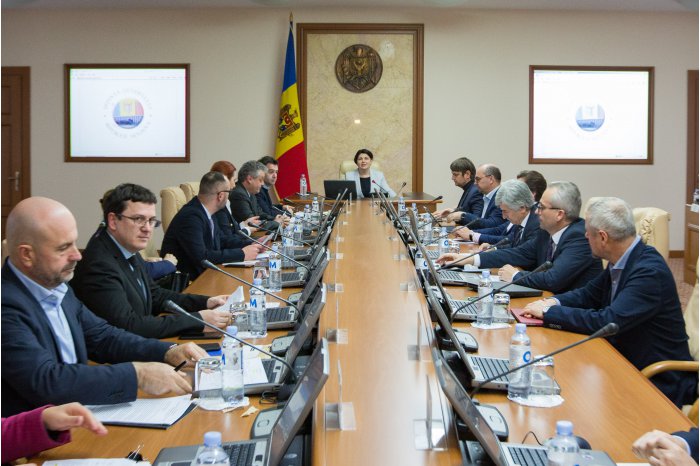
Moldovan government approves national programme on employment for 2022-2026
Chisinau, 16 November /MOLDPRES/ - The rate of women’s employment will be increased by 4 per cent and to this end, decision-makers plan to develop alternative child-care services – family-type crèches, backing employees who create their own crèches, as well as extending the supply of child-care services, at accessible prices, in all regions of Moldova. At the same time, the rate of employment of people with disabilities will be extended.
The goals are provided for in the national programme on employment for 2022-2026 and the action plan for its implementation, approved by the cabinet today, the government’s communication and protocol department has reported.
Another priority is to reduce the informal employment through the reorganization of the State Labour Inspectorate, enforcing stimulating measures, in order to facilitate the switch of economic agents from the informal sector to the formal one, regulation of the non-standard forms of labour, including of seasonal activities of day workers, as well as enhancement of the degree of awareness of the negative effects of the non-declared labour by residents.
Also, emphasis is put on the employment of people with special needs, with more actions planned on the purpose: enhancing the accessibility of disabled people to the active services and measures of employment, establishing partnerships with non-governmental organizations and employers for the economic integration of these categories of people.
Strengthening the institutional capacities of the National Employment Agency (ANOFM), optimizing the financing, digitalization and automation of services and measures of employment are other benchmarks of the national programme on employment for 2022-2026. Through enforcing these actions, decision-makers rely on the cutting of the deficit of qualified labour force, triggered by the excessive migration abroad, as well as on the increase in the number of active population and of opportunities of employment in the rural environment.
The cost of the programme’s implementation is estimated at about 274 million lei, due to be covered from the state budget, as well as from means of development partners: International Labour Organization, United Nations Population Fund, World Bank, United Nations Development Programme, German Agency for International Cooperation (GIZ).
Photo: Government
Moldovan parliament speaker says heads of diplomatic missions promoters of Moldova, its goal of European integration
Moldovan president, Diaspora representatives discuss returning, reintegration of citizens at home
Moldovan PM has meeting with Romania's foreign affairs minister
First meeting of health care experts of 2025 year held in Bender
Moldovan PM, Polish Ambassador discuss Poland's support for Moldova's development, European path
Moldovan PM, Chinese Ambassador discuss concrete benefits for citizens brought by collaboration between two states
Moldovan president outlines foreign policy priorities for 2026 at assembly of Moldovan ambassadors
Christmas Tree inaugurated at Moldova's Presidency: visitors are welcome
PM says Europe becomes 'Home' for Moldovan payments too, by joining SEPA, MIA
PM, president of top European bank discuss opportunities of cooperation between Moldova and banking institution
Head of State, EBRD President discussed development projects and attracting investments into Moldovan economy
Parliament Secretariat officials engaged in experience exchanges with European Parliament and Parliaments of Austria and Albania
Moldovan president says Police have been on frontline of defending democracy, sovereignty of Moldova
Moldovan president's message on National Police Day
Traffic affected by dense fog, ice on Moldova's national roads
VIDEO // Parliament speaker presents Moldova's most important achievements of 2025; 1.9- billion-euro package, construction of Vulcanesti – Chisinau Line among key actions
Heavy traffic at Leuseni, Palanca border crossing points of Moldova, in outbound direction
Mayor of Moldova's Cahul city reads 101 books during one year
Moldovan General Police Inspectorate increases patrols on national roads toward border crossing points
Top 5 priorities of Moldova's Foreign Affairs Ministry in 2026: economic diplomacy, European integration, strengthening consular support for Diaspora
PHOTO // Overnight interventions: road workers conduct anti-slip operations across all regions of Moldova
PHOTO // Teachers, resident physicians, students of Moldova's Nicolae Testemitanu State Medical University provide free medical assistance to Ukrainian refugees
Moldovan foreign affairs minister, on events in Venezuela, says it is essential to ensure democratic transition due to meet needs, interests of people
VIDEO // First 42 rural families of Moldova energy renovate homes with EU support
Romania to build first five km of Ungheni – Chisinau highway, continuation of Union Highway
Sleet, black ice on Moldova's roads; drivers urged to adjust speed
Last section of Union Highway goes to tender; Romanian state secretary says highway no longer paper project, but historical reality
Moldova increases renewable energy production capacity 12-fold in last five years
Sleet, freezing rain, ice forecast in Moldova; meteorologists issued Yellow Code for complicated weather conditions
Chisinau Airport announces high traffic during winter holidays

